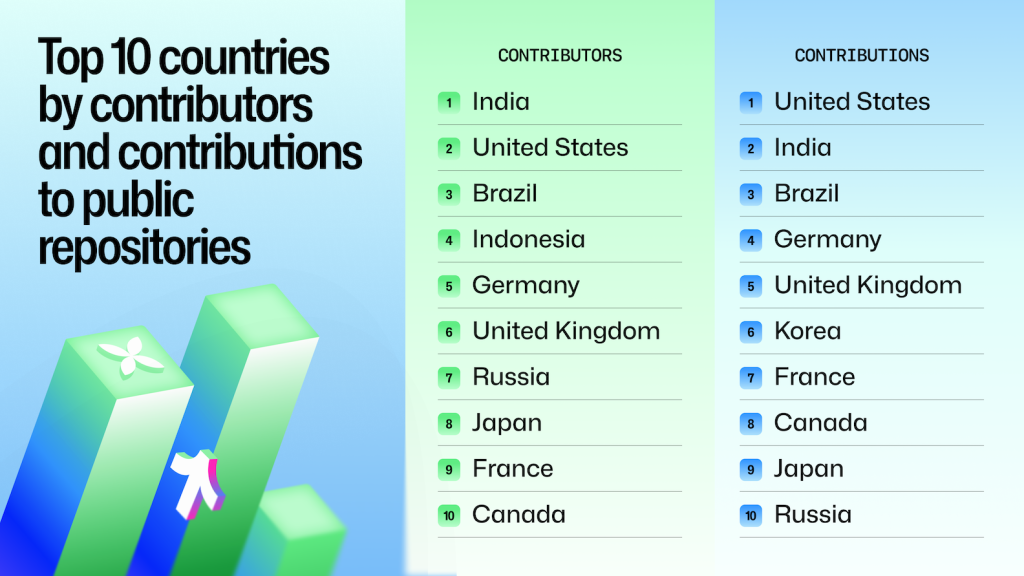India leads GitHub’s open source surge
Plus: Europe goes sovereign on software, and much more.
Hi folks,
GitHub’s Octoverse report tops this week’s issue, with India’s developer boom pushing it to the centre of open source.
Elsewhere, Europe’s also flexing its digital-sovereignty muscles: the International Criminal Court is dumping Microsoft Office for OpenDesk, Austria’s switching to Nextcloud, and Red Hat’s rolling out sovereign support for the EU.
Plus more…
As usual, feel free to reach out to me with any questions, tips, or suggestions: forkable[at]pm.me.
Paul
Open issue
A new center of gravity for open source?
India has become the new engine of open source growth. GitHub’s recent Octoverse report shows the country added more than 5.2 million developers in 2025, representing more than 14 percent of all new sign-ups — this makes it the single largest source of new developers worldwide, outpacing the U.S. in growth.
Moreover, India now hosts the largest public and open source contributor base on the platform, reflecting both its booming developer population and its growing influence in open source adoption. The U.S. still leads in total contributions, with higher per-developer activity, but the global balance of open source is shifting fast.
Overall, the Octoverse report records 36 million new developers joining GitHub in 2025, lifting the total past 180 million.
Public repositories grew by nearly a fifth to 395 million, while AI projects dominated the fastest-rising list. TypeScript overtook both Python and JavaScript for the first time, and almost 80 percent of newcomers used GitHub Copilot in their first week.
The report also highlights the interdependence between public and private development. Of the 1.6 billion total contributions made on GitHub this year, 81.5 percent occurred in private repositories, even though 63 percent of all repositories are public. Private repositories grew faster — up 33 percent year-on-year, compared with 19 percent for public ones — reflecting how much organizational and internal development now happens on GitHub. Yet those private projects still depend heavily on the public open source ecosystem.
“The split highlights GitHub’s dual role,” the report notes. “Most day-to-day work takes place in private projects, but depends on libraries, models, and frameworks in public open source.”
Despite all that, governance trails the boom: only 2 percent of public repositories include a code of conduct and about 5 percent offer contributor guides — a reminder that community maturity hasn’t quite kept pace with scale.
Read more: GitHub Octoverse blog
Patch notes
Europe’s sovereign software push continues
The International Criminal Court is replacing Microsoft Office with OpenDesk — a European open-source productivity suite developed under Germany’s Sovereign Tech Fund. The shift comes some nine months after U.S. sanctions on ICC staff, which reportedly cut off access to Microsoft services for Prosecutor Karim Khan, underscoring the risks of relying on foreign cloud providers for sensitive institutions.
In Austria, meanwhile, the Ministry of Economy has migrated its staff to Nextcloud, citing compliance, data protection, and digital sovereignty as drivers. The twin moves point to a broader European shift toward self-hosted, open-source platforms over U.S. cloud services.
Read more: Euractiv & Nextcloud blog
Red Hat launches sovereign support for the EU
Red Hat has introduced Confirmed Sovereign Support, a new framework tailored to European Union rules on data residency and open source assurance. The program lets public and private customers prove compliance with EU digital-sovereignty requirements, while still running fully open source Red Hat software across hybrid and cloud environments.
Read more: Red Hat
Nebius releases open platform for AI models
Nebius, the London-headquartered AI infrastructure company that emerged from the ashes of Russian tech titan Yandex, has unveiled a new platform for hosting and running open-weight AI models, positioning itself as a more open-aligned alternative to those from the big tech giants.
The service offers compute, orchestration, and model deployment tooling aimed at European developers seeking autonomy from U.S. hyperscalers.
Read more: Nebius press release
Right on, Cue
Schema-validation project CUE has spun up CUE Labs, a new company led by creator Marcel van Lohuizen to commercialise and expand the open-source configuration language.
The launch follows rising adoption among cloud-native teams, and includes backing from open source investors such as OSS Capital.
Read more: Cue blog
CNCF opens end-user contributor program
The Cloud Native Computing Foundation (CNCF) has launched an End User Contributor Program, giving enterprise users who actively contribute to CNCF projects direct channels for influence, recognition, and governance access — a move to formalise participation from non-vendor organisations.
Read more: CNCF blog
It’s a kind of Magika
Google has released Magika 1.0, the first stable version of its open-source AI tool for file-type detection. The update introduces faster performance, improved model accuracy, and broader format support, reinforcing Google’s gradual shift toward open development in security and content-classification tooling.
Read more: Google blog
Deepnote opens its notebooks
Collaborative data-science platform Deepnote has gone open source, positioning itself as a modern successor to Jupyter Notebook. The move opens its real-time collaboration and workflow engine to the wider community, aiming to make shared, browser-based analysis part of the open data-science stack.
Read more: The New Stack
And finally…
OmniTools: the everything app
Ever wanted one tool to crop an image, merge a PDF, format some JSON, and convert a timestamp — without wading through ad-ridden websites? That’s exactly what OmniTools offers, with a sleek open-source web app bundling more than 80 everyday utilities under one tab. It runs locally or self-hosted, so nothing you process ever leaves your machine — a small victory for privacy and sanity alike.
Read more: OmniTools



